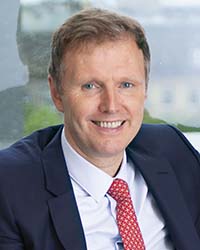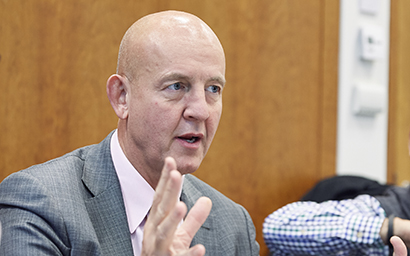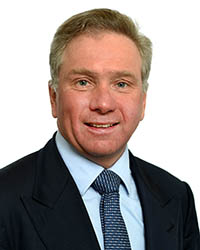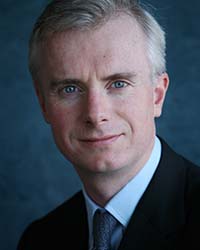Ahead of October’s online-only event, funds industry thought leaders share what’s on their minds.
Europe’s largest asset management conference of the year will, for the first time in its history, be held online in October.
The move from sunny Monaco (where the event was to have been held in June) to a digital-only conference hasn’t stopped many of the industry’s heavyweights signing up as panellists at the prestigious event.
Industry leaders taking to the stage this year include Chris Adamkowski, head of industry at Google, the astronaut Tim Peake, Hendrik Du Toit, chief executive of Ninety One, Martin Gilbert, chairman of Revolut and Euan Munro, chief executive of Aviva Investors.
Another big change this year is that FundForum will, together with the IM Power conference and the Sustainability and Impact Investor Forum, be spread over 12 days rather than the usual four.
The conference organisers, Informa, say that the nature of a digital event means that it will be more manageable for delegates to spread their attendance over almost two weeks, rather than take part in a concentrated live conference experience.
To make things as flexible as possible for participants, this year’s keynote speeches, fireside chats and panel discussions will not only be available to listen to live, but also on demand.
For many, of course, FundForum is as much about networking as attending panel events. To address that, a new networking app has been created that will allow delegates to engage with speakers in real-time through Q&A, audience polling and chat features.
Meanwhile, a specially created digital platform with video-meeting software will also allow delegates to wander through an online version of the usual exhibition hall and to interact with companies and people they meet.
After holding the annual conference in Berlin for several years and Copenhagen last year, lnforma is hoping, Covid permitting, to bring next year’s event back to its previous long-time home of Monaco.
In the meantime, ahead of the conference getting underway, we asked a selection of speakers and delegates about some of the many topics due to be discussed.
 STEPHEN BIRD,CHIEF EXECUTIVE, STANDARD LIFE ABERDEEN
STEPHEN BIRD,CHIEF EXECUTIVE, STANDARD LIFE ABERDEEN
How will the investment mangement landscape take shape over the next 10 years?
Both the relationship and balance of power between the consumers and the providers of financial services is radically changing. Big data and its enabling components, from the advent of the smartphone to the ability to harvest and translate information, have driven the democratisation of financial services. Customers have more information and transparency than ever and consequently relationships are less sticky and potentially shorter-lasting. Customers can and do move on without historical penalty. How do financial services organisations respond and not only survive but thrive? How do established providers take on the new fintechs on the block? What is the role of heritage, brand and legacy? How is trust established and maintained? These are just some of the areas that I will aim to cover in this panel session.
 RICHARD GARLAND, MANAGING DIRECTOR, GLOBAL ADVISOR, NINETY ONE
RICHARD GARLAND, MANAGING DIRECTOR, GLOBAL ADVISOR, NINETY ONE
What does the new age client experience look like in practice? What is the importance of client needs against the product and how do clients want to engage?
Everyone is struggling with information overload. Not only are we being bombarded by too much information, we are also being hit from all angles – email, Twitter, LinkedIn, Zoom calls etc. You name it, we’re getting it!
Clients want simple, clear and concise information. And they want it on a single platform they can access at the time they want it.
As product suppliers, we have to know and understand what your clients want. And provide it to you in the format you can use directly with your clients – whether it be written form, short videos or audio files.
Your job, as advisers, is to provide the simple-to-use client interface, where people can consume that information in the most optimal format.
And somehow within all this, we have to inject that sense of personality which both stands out and, importantly, keeps trust.
 ANTOINE GOUPIL, MARKETING MANAGER FRANCE, SOCIETE GENERALE SECURITIES SERVICES (SGSS)
ANTOINE GOUPIL, MARKETING MANAGER FRANCE, SOCIETE GENERALE SECURITIES SERVICES (SGSS)
What will be the key challenges for the industry as it invests in digitalisation?
One of the biggest challenges facing the financial industry today is to reconcile digitalisation with client proximity and quality relationships.
These opposed concepts, mainly dematerialisation and automation on one hand and human relations on the other, can only be reconciled if digitalisation develops whilst keeping a strong focus on customer experience.
Long-term relationships and trust are key for retaining clients and suppliers. Trust must be nurtured and is based on human expertise and relationship capital. Today, a supplier’s role moves from being a facilitator and administrator to accompanying the client as a solution provider.
While state-of-the-art technology can contribute to enhancing solutions, long-term relationships, based on expertise and trust between service providers and clients, remain the key to providing innovative and value-added solutions.
 JEAN RABY, CHIEF EXECUTIVE, NATIXIS INVESTMENT MANAGERS
JEAN RABY, CHIEF EXECUTIVE, NATIXIS INVESTMENT MANAGERS
As the global economy and society are impacted by the coronavirus pandemic, how are asset managers responding?
Asset managers are taking on a larger role than ever before in helping to shape the companies in which we invest and how they deal with some of the most pressing issues of our time.
Our clients and investors demand it. They are eschewing marketing hype in favour of ESG investment that makes a measurable impact, and the linkages between investment performance and successfully addressing these issues is clear.
Asset managers are also playing a key role in recapitalising the economy towards a new normal. This means pioneering new strategies to support innovation and change as well as meeting the retirement needs of our societies and helping investors meet long-dated liabilities in a low-rate environment.
As an active manager, our affiliates prioritise good stewardship. Working together as an industry, we are already achieving change, but our collective voice is loud and we should use it more forcefully. Financial markets right now are too focused on the short term.
Short-term goals, often spurred on by quarterly reporting, are geared toward the needs of short-term investors. If we are truly going to consider the needs of all stakeholders, today and in future generations, then that takes a long-term approach.
 MICHAEL O’SULLIVAN, AUTHOR, THE LEVELLING
MICHAEL O’SULLIVAN, AUTHOR, THE LEVELLING
How will the investment mangement landscape take shape over the next 10 years?
The end of globalisation will transform all industries, but it could cripple banking and asset management if chief executives and chief investment officers don’t quickly adapt to new assets, a strained macro environment, the robotisation of investment and the need for clever, well-communicated content.
From top down, a more value-driven world, persistently low rates and high liquidity and the emergence of new finance ecosystems (i.e. retail options, crypto) are just some of the shifts that chief executives will need to tackle.
© 2020 funds europe





